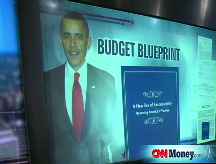Weak economy ... strong dollar
The bad news for the U.S. never seems to end. But despite all the doom and gloom, the dollar has emerged as the currency of choice once again. Here's why.

 |
| Despite more signs of weakness in the U.S. economy, the dollar has rallied against the euro this year... |
NEW YORK (CNNMoney.com) -- Stocks are at their lowest levels in about 12 years. The economy shrunk by more than 6% in the fourth quarter. Companies are laying off people left and right.
And oh yeah, the government has essentially nationalized Citigroup (C, Fortune 500) and AIG (AIG, Fortune 500).
There's no denying that the U.S. economy is in tatters. But how about that dollar? Yup, despite the unrelenting stream of bad news about the economy and markets, the greenback has stood out as one of the top performing currencies this year.
The dollar is up about 9% against the euro and 7% versus the Japanese yen so far in 2009. It's also edged slightly higher against the British pound. What gives?
Well, as strange as it may sound, investors may be betting that the U.S., which arguably led the rest of the world into the global recession, will also be the first to emerge from the downturn.
"The U.S. was one of the first nations to respond to the weakness with aggressive monetary policy measures. So it could be one of the first countries out while Japan and Europe might be the last ones out," said Kathy Lien, director of currency research at GFT, a foreign exchange and futures brokerage firm.
Along those lines, even though most of the financial bailout packages have so far been greeted with almost universal disdain by investors in stocks, currency strategists are encouraged that the U.S. is taking more an active role in trying to fix the banking system.
"There a belief that the U.S. is doing more than any other nation to correct their problems. That stems from the different investments by the Fed and the Treasury in the financial sector," said Andrew Busch, global FX market strategist with BMO Capital Markets in Chicago.
Mind you, this does not mean a recovery is around the corner. Lien thinks the U.S. economy is likely to deteriorate further before things finally improve.
Still, as bad as the U.S. economy is faring, it's much worse in other parts of the world. So the dollar is being viewed as a relative pocket of stability.
"The only reason the dollar is rallying is because it is a safe haven play. The problems in Europe are much deeper," Lien said. "Investors are focusing on a prolonged downturn in the U.S. economy and the ramifications for the rest of the world. If the U.S. doesn't recover soon, nobody else will recover."
Busch agreed that the dollar now seems to be the only safe haven among currencies. He pointed out that with interest rates at practically zero, investors are flocking to U.S. Treasurys, despite concerns about what he referred to as a "zeppelin-ing" -- as opposed to merely "ballooning" -- increase in the federal budget deficit this year.
Of course, the dollar rally could quickly come to an end if nations like China, a big buyer of Treasurys, suddenly lose faith in the U.S. But there are no signs of that happening just yet.
To that end, Jacob Oubina, currency strategist at online currency trading site Forex.com, pointed out that last week's U.S. Treasury auctions were oversubscribed.
Meanwhile, he noted that demand was weak for a federal bond auction in Germany earlier this year, a sign that not all countries are going to find it easy to raise new funds to pay for bailouts or other fiscal stimulus.
What that means is that the rest of the world still appears to be confident in the financial solvency of the U.S., even as many Americans seem to doubt that this recession will end anytime soon.
"The global investor still thinks the U.S. can pay off their debts -- no matter how big they are at the moment," Oubina said. ![]()



